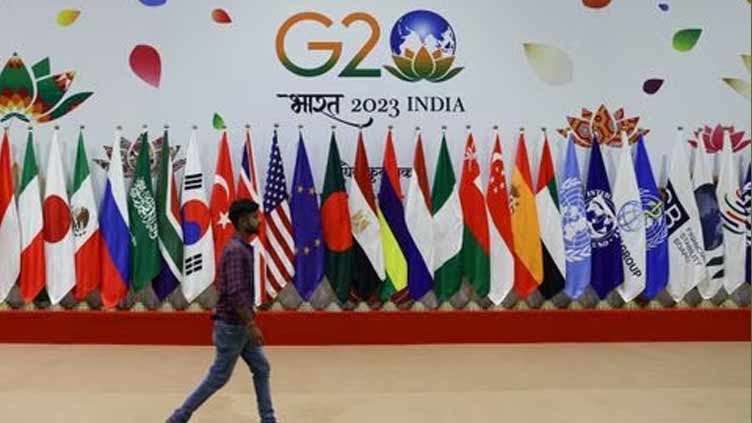G20 communique omits mention of Middle East conflict

World
Failure to mention the violence revealed deep divisions roiling the G20, says Eric LeCompte
MARRAKECH, Morocco (Reuters) - Group of Twenty (G20) economies made no mention of the conflict between Israel and Hamas in a communique on Friday, raising new questions about the role of a forum split by Russia's invasion of Ukraine last year.
The text, agreed by G20 finance leaders gathered for an IMF-World Bank meeting in Marrakech, noted deep anguish at the loss of life and destruction in natural disasters in Libya and Morocco and said they stood in solidarity with the people there.
But there was no reference at all to the crisis in Gaza, where Israel's military has told more than 1 million people to relocate south as it amassed tanks for an expected ground invasion after a devastating attack by militant group Hamas.
A source briefed on the G20 discussions said differences over the Hamas attacks and Israel's response had prevented inclusion of any statement on the Israel-Gaza conflict in the communique, pitting Russia, China, India and Saudi Arabia against the United States and Western powers.
Indian Finance Minister Nirmala Sitharaman told a news conference in Marrakech that the Israel-Gaza events were left out of the G20 communique because they did not feature much in the financial officials' discussions.
One source familiar with the G20 deliberations said the Israeli-Palestinian conflict had long been a divisive issue among G20 members, and said it was not surprising that they decided to skip any mention.
The latest escalation of the Middle East conflict began at the weekend just as G20 leaders started gathering in Marrakech.
Failure to mention the violence revealed deep divisions roiling the G20, said Eric LeCompte, executive director of Jubilee USA Network, a coalition of more than 750 religious groups and organisations.
"What's happening in Israel and Gaza is a horrific tragedy and if we can't stand up for the protection of children on both sides, it shows how stalemated they are," he said.
The G20 has been deeply divided since Russia's invasion of Ukraine in February 2022. Its membership includes the United States, European powers, China, Russia, Saudi Arabia, other major economies of Asia, South America and most recently the African Union.
On the Ukraine war, the G20 text stuck close to language agreed at last month's meeting of the group's leaders in New Dehli urging countries to stick to UN rules on territorial integrity, highlighting the human suffering of the conflict and noting "different views and assessments of the situation".
Separately, a European official said the customary final communique to wrap up the week of IMF meetings ending Saturday would not be possible because Nordic European and Baltic countries considered the proposed wording on the Ukraine war - a carbon copy of the G20 language - was "too watered down".
Fears are growing that the latest Middle East strife could spread, with Iran warning of a response from its allies, which include Hamas and Hezbollah in Lebanon.
The crisis hung over the IMF-World Bank meetings on the global economy, where World Trade Organization chief Ngozi Okonjo-Iweala told Reuters officials were "on eggshells".
She said the Israel/Hamas conflict would have "really big impact" on already weak global trade flows if it widened throughout the region, joining a chorus of other financial officials who say they are carefully watching the conflict.
"The real problem is to be able to contain the (Middle East) crisis as much as possible so as not to create another element of infection on top of Ukraine's crisis," Italian Economy Minister Giancarlo Giorgetti told reporters.
Werner Hoyer, head of the European Investment Bank which has projects in Israel, the West Bank and Gaza, said finance leaders in Marrakech had no choice but to grapple with the implications of the situation.
"(It would be) too artificial to sit here and do business as usual while the world is on fire," he said.


